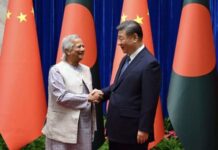
On Ukraine
The Ministers reviewed mutual efforts to respond to the worsening humanitarian crisis in Ukraine and assessed its broader implications. They urged an immediate cessation of hostilities. The Ministers unequivocally condemned civilian deaths. They underscored that the contemporary global order has been built on the UN Charter, respect for international law, and the sovereignty and territorial integrity of all states.
On Quad
Recalling the inaugural virtual Quad Leaders’ Summit in March 2021, the in-person Quad Leaders’ Summit in September 2021 in Washington, the February 2022 Quad Foreign Ministers’ meeting in Melbourne, and looking forward to the next Quad Leaders’ Summit in Tokyo in 2022, the Ministers reaffirmed their commitment to a free and open Indo-Pacific in which the sovereignty and territorial integrity of all states are respected, and countries are free from military, economic, and political coercion.
They further reaffirmed their dedication to promoting regional stability and prosperity, with an inclusive regional architecture, abiding by the rule of law, the freedom of navigation and overflight, peaceful resolution of disputes, and ASEAN centrality. They also reiterated the importance of adherence to international law to meet challenges to the rules-based order, including in the South China Sea.
Science, Technology, Cybersecurity, and Space
Reflecting on the positive science and technology cooperation between the two countries, the Ministers welcomed the announcement of a Joint Commission Meeting on Science and Technology in 2022, to discuss future science and technology collaboration.
The Ministers applauded the recent and upcoming meetings of the India-U.S. Cyber Dialogue and the Information and Communication Technology (ICT) Working Group to deepen cybersecurity cooperation. They strongly condemned ransomware and other cyber-related crimes and recognized the need to bolster protection of critical networks and infrastructure.
Recalling their countries’ strong tradition of space exploration and endeavors, the Ministers announced the conclusion of a Memorandum of Understanding on Space Situational Awareness and pledged to expand bilateral space cooperation, acknowledging the pivotal role international cooperation plays in the long-term sustainability and safety of the outer-space environment. They applauded the ongoing development of the NASA-ISRO Synthetic Aperture Radar (NISAR) satellite, planned for launch from India in 2023. The NISAR mission will collect data vital to tackling the climate crisis. The Ministers also looked forward to the convening of the next India-U.S. Civil Space Joint Working Group in 2022.
On UNSC Permanent Membership
The United States congratulated India for its significant contributions as a member of the United Nations Security Council (UNSC) for the term 2021-2022. In this context, the United States expressed its appreciation for India’s leadership as the Chair of the three Committees of the Security Council: the 1988 Taliban Sanctions Committee, the 1970 Libya Sanctions Committee and the 1373 Counter Terrorism Committee.
The Ministers reiterated their commitment to work together in close coordination at the UNSC and in international organizations. The United States reaffirmed its continued support for India’s permanent membership in a reformed UNSC and for India’s entry to the Nuclear Suppliers’ Group.
On Afghanistan
The Ministers called on the Taliban to abide by UNSC Resolution 2593 (2021), which demands that Afghan territory must never again be used to threaten or attack any country or to shelter or train terrorists, or to plan or finance terrorist attacks. The Ministers urged the Taliban to adhere to these and all other commitments; respect the human rights of all Afghans, including women, children, and members of minority groups; and uphold freedom of travel. They also emphasized the importance of an inclusive Afghan government and unhindered access for the United Nations and its implementing partners to deliver humanitarian assistance. The Ministers recommitted to close consultations on Afghanistan to help facilitate an inclusive and peaceful future for all Afghans.
Counterterrorism
The Ministers welcomed the convening of the 18th Meeting of the India-U.S. Joint Working Group on Counter Terrorism and the 4th Session of the India-U.S. Designations Dialogue in October 2021. The Ministers strongly condemned any use of terrorist proxies and cross-border terrorism in all its forms and called for the perpetrators of the 26/11 Mumbai attack, and Pathankot attack, to be brought to justice. They called for concerted action against all terrorist groups, including groups proscribed by the UNSC 1267 Sanctions Committee, such as al-Qa’ida, ISIS/Daesh, Lashkar-e-Tayyiba (LeT), and Jaish-e-Mohammad (JeM), and Hizb ul Mujahideen. The Ministers called on Pakistan to take immediate, sustained, and irreversible action to ensure that no territory under its control is used for terrorist attacks. The Ministers committed to continued exchange of information about sanctions and designations against terror groups and individuals, countering violent radicalism, use of the Internet for terrorist purposes, and cross-border movement of terrorists. The Ministers also emphasized the importance of upholding international standards on anti-money laundering and combating the financing of terrorism by all countries, consistent with FATF recommendations.
The Ministers also reaffirmed their support for the early adoption of a UN Comprehensive Convention on International Terrorism (CCIT) that advances and strengthens the framework for global cooperation and reinforces that no cause or grievance justifies terrorism.

















